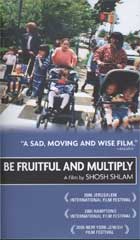
Be Fruitful And Multiply 2005
Distributed by First Run/Icarus Films, 32 Court St., 21st Floor, Brooklyn, NY 11201; 800-876-1710
Produced by Shosh Shlam, Marek Rozenbaum
Directed by Shosh Shlam
VHS, color, 50 min.
College - Adult
Gender Studies, Jewish Studies, Parenting, Religious Studies, Women's Studies
Date Entered: 07/13/2007
Reviewed by Gloria Maxwell, Reference Librarian, Penn Valley Community College, Kansas City, MOTo women in the Ultra-Orthodox Jewish community, the commandment to “Be fruitful and multiply” means that they serve God by giving birth to as many children as possible. For some women this means that they will be pregnant and nursing for nearly all of their reproductive years. This may mean 16, 14, 10, or even 20 children. In this documentary, Shosh Shlam goes inside the Orthodox Jewish community to talk to four women in order to explore their true feelings about devoting their lives to rearing children. Two of the women revel in their role as mother. The woman from Brooklyn, N.Y., has 16 children and enjoys every aspect of birthing, nurturing, and maintaining the home. Her daughters place home as the first priority, with school placed after home. For the sons, school and education come first. All of the children help with chores, cooking, cleaning, and laundry. The mother also has responsibility for the extensive preparations related to Jewish religious observances.
The primary woman featured in this documentary is Yentel, a child birth trainer from Mea Shearim, Jerusalem, who appears in this documentary without her husband’s knowledge or permission. She expresses the anguish and torment that many of her friends experience. She describes the mental fatigue and emotional draining that comes from having children one right after the other, and the expectation for families to be as large as possible. Yentel and other women who want to limit the number of children they have need to get permission from their Rabbi, with their husband’s consent. In many instances, the husband is the one who actually speaks to the Rabbi on behalf of his wife. Yentel and another woman featured who shares her concern talk about the emotional needs of nurturing children and the difficulties of doing this for increasing numbers of children.
Shosh Shlam provides a balanced perspective on this issue. While Yentel is the primary focus on the film, there are enough contrasts with the two women who are at peace with their role as mothers to upwards of ten children. The contradiction of Yentel’s viewpoint is reflected ultimately in the suicide of one of her friends who lost the struggle over her own limits and the expectation of her community.
This is a powerful documentary on an important subject. Audio and video quality are good. English subtitles accompanied most of the Hebrew throughout the film. One weakness is that some Hebrew terms were used that were not defined, making it a bit more difficult for non-Jewish viewers to completely understand what’s being said. Original music supplies an appropriately Jewish mood throughout.
This film would be an excellent addition to any Jewish Center or religious studies program. Also highly suitable for a junior college or four-year institution that supports religious studies, particularly those that relate to Judaism, as well as women’s studies. Recommended.